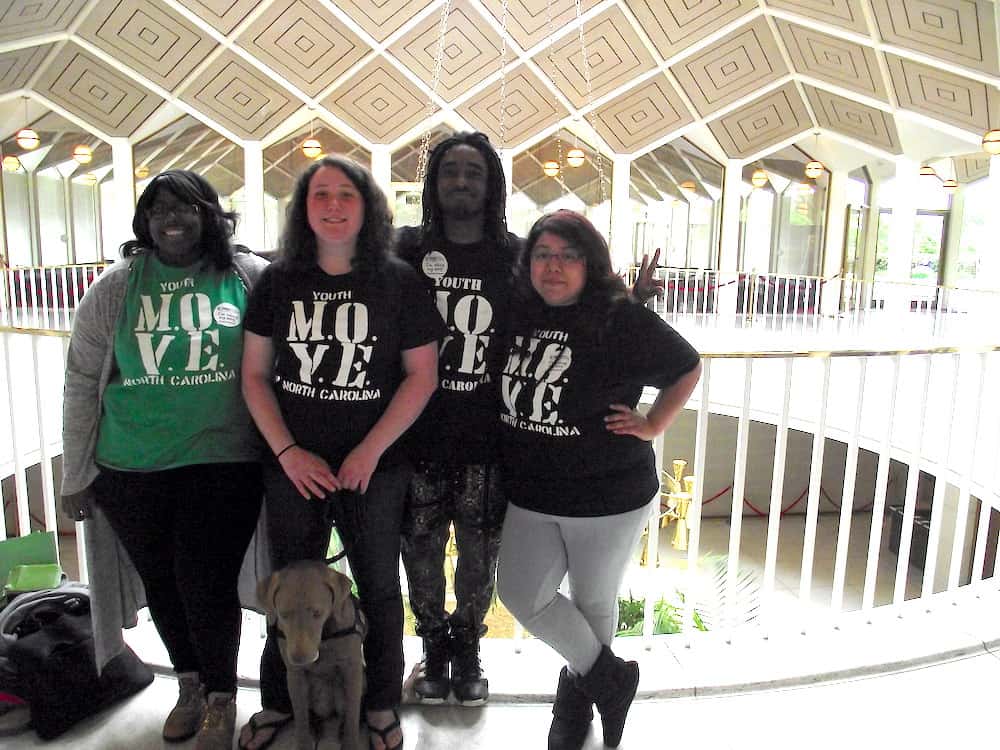
Mental health advocates shared their stories with legislators to persuade them to protect funding for mental health, expand access to care and ensure services are accessible to everybody.
Ariel Wolf, 21, spent five years in state psychiatric hospitals and residential treatment facilities without getting the care that addressed her specific needs.
“Five years of my life is gone, and it was never useful,” she said. “[I] would love to see people spearheading their own treatment.”
Wolf and her peers from Youth M.O.V.E. – an organization that advocates on behalf of youth in the criminal justice, child welfare and mental health systems, among others – said they learned useful tips in storytelling and that they look forward to returning to the General Assembly. Wolf was among an estimated 50 people who came to the General Assembly to learn how to share their personal stories of mental illness in a compelling way with lawmakers. The National Alliance of Mental Illness chapter of North Carolina organized a session on Jones Street to train people how to use their personal experiences in advocacy work.
Schools and mental health
Wolf and others said school systems in particular need to change how they address behavioral issues with students with mental illnesses.
They said that too often schools resort to disciplinary actions such as suspensions rather than recognize that a student may need treatment for a mental illness.
“I know that when I was going through the educational system, I was never being properly and effectively treated, and that outcome ended up pushing me away from school,” said Camaron Freeman,18 and president of Youth M.O.V.E. “What I needed was help.”
Freeman and Veronica Arias, 23, said that while they were in school, neither teachers nor other staff talked about mental health as a problem that students face.
“Mental illness is invisible,” Wolf said. “You wouldn’t know just by looking … that somebody has a mental illness.”
Overmedication among children was another issue that mental health advocates had on their minds. Arias and Niketa Currie, 24, both have children diagnosed with attention deficit hyperactivity disorder. They said that they were encouraged by the school system to get their children treated with medications like Adderall.
Instead, they both declined to use medication to treat the ADHD. Arias and Currie said they use alternative methods such as positive parenting to deal with behavioral issues.
Currie and others said that side effects from medication such as Adderall were worrisome. They described some of those side effects as a “zombie” effect or a “foggy brain.”
Freeman said she was diagnosed with ADHD at an early age and placed on Adderall, a commonly prescribed drug to treat ADHD.
The drug has a laundry list of symptoms that include nausea, vomiting and seizures. It can also be addictive.
“It imbalanced me,” Freeman said.
Currie said her son excels in school without medication. “I’m not going to ‘zombify’ [my son],” she said. “I don’t stand for putting kids on medication.”
Getting care to youth
Nicholle Karim, public policy coordinator for the North Carolina chapter of the National Alliance on Mental Illness, said it was especially important to get youth aged 16 to 24 into programs developed to meet their own specific needs. She said that age group has many special considerations and needs.
“You really are saving a generation if you can get someone into treatment early and get them into a treatment that is evidenced-based and works,” Karim said.
Karim added that people shouldn’t have to wait for days in the emergency room to get treatment for mental illness. “We wouldn’t tolerate that for a heart attack or another type of medical condition,” she said.
The wait that mental health patients face in emergency departments is well documented, and January in particular was a rough month for patients in Wake County. The average wait in the emergency department for a referral to a psychiatric hospital is roughly 75 hours in North Carolina.
Karim said one of NAMI’s main legislative goals is to advocate for improved access to mental health care in a public system with public accountability by expanding Medicaid. North Carolina is one of 22 states that has yet to expand Medicaid as allowed for under the Affordable Care Act.
This story originally appeared in North Carolina Health News and is shared by EdNC through a content-sharing agreement with nonprofit news organizations in North Carolina.
